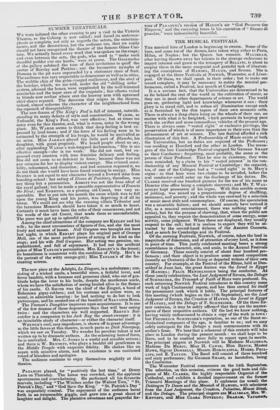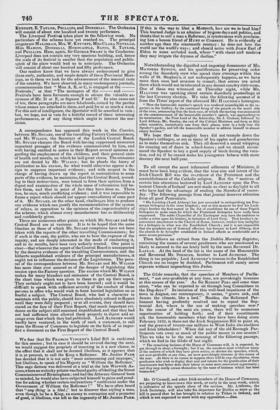THE MUSICAL FESTIVALS.
THE musical hive of London is beginning to swarm. Some of the bees, and some too of the drones, have taken wing either to Paris, Milan, or Naples: but the Queen bee remains. MALIBRAN, after having thrown away her talents in the strange endeavour to impart interest and grace to the trumpery of BELLINI, is about to employ them in the more congenial and grateful task of illustrat- ing the conceptions of HANDEL, HAYDN, and SPOHR. She is engaged at the three Festivals at Norwich, Worcester, aid Liver- pool. Of these, we shall speak in their order ; but to make our record complete, it may be necessary to notice the musical per- formance, called a Festival, last month at Cambridge.
It is a curious fact, that the Universities are determined to be as far behind the rest of the world in the cultivation of music, as they are in most other departments of science or art. The world goes on, gathering light and knowledge whenever it can : their glory is to stand still, and to refuse all illumination except such as is furnished by the dim tapers of their own monastic cells. There is always a drag-chain hung on the wheels of their car, no matter with what it be freighted, which prevents its keeping pace with the swifter and more commodious vehicles of the present age. There is always some " vested right " or exclusive privilege, the preservation of which is of more importance in their eyes than the advancement of art or science. The late festival afforded a rich illustration of this fact. A Professorship of Music exists at both the Universities, but no duties are required of the Professors ; one residina. at Hereford and the other in London. The mana- gers of the late Cambridge Festival engaged Sir GEORGE SMART as their Conductor ; forgetting, most probably, the name or the person of their Professor. That he was in existence, they were soon reminded, by a claim to his " vested interest" in the con- ductorship of any Musical Festival at Cambridge: the organist, too, of one of the Colleges had a " vested right" in St. Mary's organ : so that here were two claims to be satisfied, before the real conductor could enter on the discharge of his duties. Dr. CLARKE received one hundred guineas for the use of his name as Director (the office being a complete sinecure); and Mr. T. WAL- MISLEY kept possession of his organ. With this notable system of jobbing, was mixed up a proportionate degree of shuffling, meanness, and poverty ; and the whole was crowned by a selection of music most stale and commonplace. Of course, the speculation was a miserable failure; and we should scarcely have noticed it (for, as a musical entertainment, there was nothing worthy of notice), but for the purpose of showing, that, when the public are appealed to, they require the demonstration of some energy, some activity, some judgment. When these are displayed, they usually respond to the call; but it is useless to expect they will be at- tracted by the second-hand dulness of the Ancient Concerts.. And so much for Cambridge and its Festival. Of the ensuing Festivals, Norwich, of course, takes the lead in magnitude of dimension, and of attraction of every kind, as itdoes in point of time. This justly celebrated meeting bears a strong resemblance in character, aim, and scale, to the Annual Festivals of Germany. These usually consist of about four hundredper- formers ; and their object is to produce some sacred composition (usually an Oratorio) of the living or departed writers of their own country. For example, at the Festival of the Rhine, held at Dus- seldorf in June last, the great feature was the Israel in Egypt of HANDEL; FELIX MENDELSSOHN being the conductor. At these yearly celebrations, the Last Judgment of SPOHR, the Deluge of SCHNEIDER, the Triumph of Faith Of RIES were produced. So, each returning Norwich Festival introduces to this country some work of high Continental repute, and has thus earned for itself the preeminent rank which it holds. The principal features of this meeting (which begins on the 17th September), are the Last Judgment of Stamm, the Creation of HAYDN, the Israel in Egypt of HANDEL, and the Deluge of F. SCHNEIDER. Of the three for- mer oratorios, it may be safely affirmed that they are the master- pieces of their respective authors. Of the last we know nothing,. having vainly endeavoured to obtain a copy of the work in town : but FREDERICK SCHNEIDER'S reputation, as one of the finest ec- clesiastical composers of the age, is familiar to us ; and we may safely anticipate for the Deluge a rank commensurate with its author's fame. We hear that a rehearsal of this oratorio will take place in London during the present month : we shall hope to be there, and to be enabled more fully to report upon its merits. The principal singers at Norwich will be Madame MALIBRAN,_ Madame DE MERIC, Miss H. CAWSE, Miss BRUCE, Master HOWE, Signor DONZELLI, Messrs. HORNCASTLE, HOBBS, PHIL.. raps, and E. TAYLOR. The Band will consist of three hundred and sixty performers; Sir GEORGE SMART, as heretofore, being the Conductor.
The Worcester Festival commences on the 24th September. The selection, on this occasion, evinces the good taste and dili- gence of Mr. CLARKE, the highly respectable Organist of the Cathedral, and exhibits a decided improvement on the former Triennial Meetings of this place. It embraces (as usual). the Dettingen Te Deana and the Messiah of HANDEL, with selections from the Last Judgment, the Creation, Palestine,. Mount Sinai, and the Deluge. The principal singers are MALIBRAN, Mrs. W. KNYVBIT, and MiSS CLARA. NOVELLA); BRAMAN, VAUGakarr KarNVErt, E. TAYLOR, PHILLIPS, and DONZELLI. The Orchestra will consist of about one hundred and twenty performers.
The Liverpool Festival takes place in the following week. No particulars of the scheme have yet reached us. The principal
singers are MALIBRAN, W. KNYVETT, Miss CLARA NOVELLO, Miss MASSON, DONZELLI, HORNCASTLE, SAPID, E. TAYLOR, .and PHILLIPS. Here, again, Sir GEORGE SMART iS the Conductor. Liverpool does not contain any very spacious building, and, hence the scale of its festival is smaller than the population and public- spirit of the place would lead us to anticipate. The Orchestra -will consist of about one hundred and fifty performers.
Our readers know that we have always endeavoured to give them early, authentic, and ample details of these Provincial Meet- ings, as to them we look for the advancement of the musical taste of the country. We have observed, in many contemporary journals, announcements that " Miss A, B, or C, is engaged at the — Festivals ;" or that "The managers of the and Festivals have been fortunate enough to sdeure the valuable as- sistance of Mr. D or E, or Signore F and G." In nine cases out of ten, these paragraphs are mere falsehoods, coined by the parties whose names are attached to them, and paid for at so much a word. For this sort of intelligence, the Spectator will be searched in vain ; but, we hope, not in vain for a faithful record of these interesting performances, or of any thing which ought to interest the mu- sician.

























 Previous page
Previous page